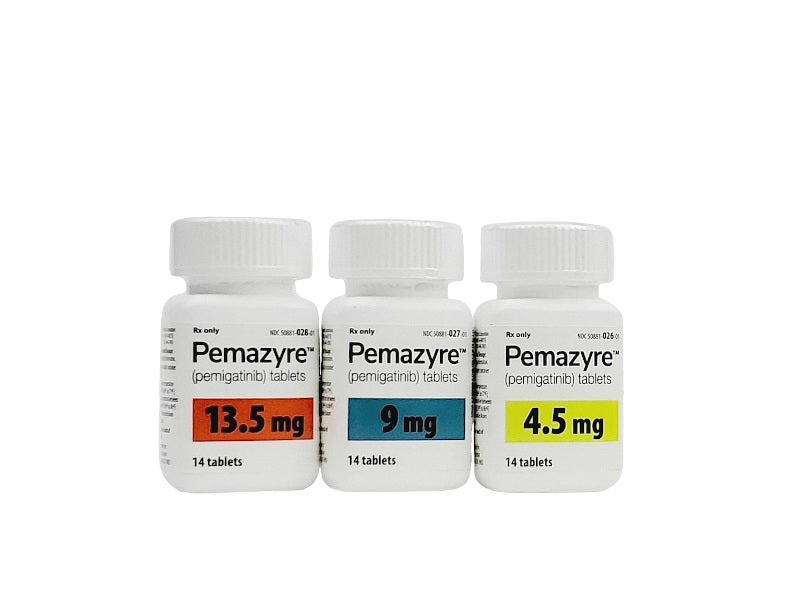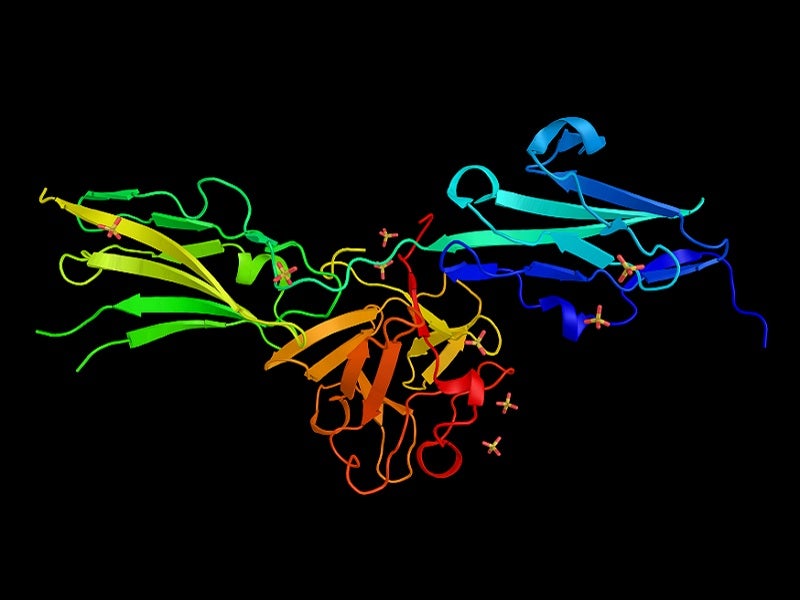Pemazyre™ (pemigatinib) is the first and only US Food and Drug Administration (FDA)-approved kinase inhibitor indicated for the treatment of cholangiocarcinoma.
Pemazyre was developed by Incyte Corporation, which granted rights to Innovent Biologics for the development and commercialisation of the drug in haematology and oncology in countries including Macau, Hong Kong, Taiwan and Mainland China.
Incyte holds all other rights for the development and commercialisation of pemigatinib outside of the US.
Pemazyre (pemigatinib) is the first targeted treatment for adults with previously treated, unresectable locally advanced or metastatic cholangiocarcinoma. It was authorised under accelerated approval on the basis of overall response rate and duration of response (DOR).
Pemazyre (pemigatinib) is available as oral tablets with a recommended dosage of 13.5mg once a day for 14 consecutive days.
Pemazyre approvals
The FDA approved Pemazyre (pemigatinib) for the treatment of patients previously treated with advanced or unresectable FGFR2 translocated cholangiocarcinoma in April 2020.
Pemazyre (pemigatinib), a fibroblast growth factor receptor (FGFR) inhibitor, also received orphan drug designation and breakthrough therapy designation in April 2020.
The new drug application (NDA) filed for Pemazyre (pemigatinib) was accepted by the FDA for priority review in November 2019.
A Prescription Drug User Fee Act (PDUFA) target action date is scheduled in mid-2020.
Marketing authorisation application (MAA) to launch Pemazyre in the European Union (EU) has been validated by the European Medicines Agency (EMA) and is currently under review.
Foundation Medicine’s FoundationOne CDx is the first and only FDA-approved companion diagnostic test for Pemazyre.
FDA approval was granted to FoundationOne CDx for the identification of patients with FGFR2 fusions or rearrangements who may be eligible for Pemazyre in April 2020.
Cholangiocarcinoma causes and symptoms
Cholangiocarcinoma is a rare and fatal type of bile duct cancer that mostly affects people who are older than 50 years of age.
Bile ducts are branched tubes that carry a digestive fluid called bile to aid the process of digestion. The ducts connect the liver and gall bladder to the small intestine.
Cholangiocarcinoma is categorised as intra-hepatic or extra-hepatic based on its location. Intra-hepatic cancer occurs in the small bile ducts inside the liver while extra-hepatic occurs in the bile ducts outside the liver.
Bile duct cancer can affect any part of the bile ducts and cause of cholangiocarcinoma is mutations in the DNA of bile ducts, which can lead to default instructions, resulting in excessive growth of cells and subsequent formation of a tumour.
Symptoms include white-coloured and greasy stools, itchy skin, fatigue, skin yellowing and eye whitening (jaundice), dark coloured urine, swelling and abdominal pain, weight loss, decreased appetite, chills and shivering, and fever.
Pemigatinib mechanism of action
Pemigatinib is a small, efficacious, selective inhibitor of fibroblast growth factor receptor (FGFR) isoforms 1, 2, and 3.
Pemigatinib blocks phosphorylation and signalling of FGFR1-3 and reduces cell viability in cancerous cell lines with the activation of amplification and fusions of FGFR, resulting in constitutive FGFR signalling.
The drug also demonstrated anti-tumour activity in mouse xenograft models of human tumours with the alteration of FGFR1, FGFR2, or FGFR3 leading to the activation of FGFR.
Clinical trials on Pemazyre
FDA approval of Pemazyre (pemigatinib) was based on the non-randomised, open-label, multicentre, single-arm, phase 2 clinical study, FIGHT-202.
FIGHT-202 clinical trial evaluated the efficacy of Pemazyre in 107 previously treated patients with locally advanced or metastatic cholangiocarcinoma with FGFR2 gene fusion or non-fusion rearrangement.
Patients were administered an oral dosage of 13.5mg Pemazyre once daily for 14 consecutive days, followed by seven days off, in each 21-day cycle until disease progression or unacceptable toxicity.
Primary outcome measures determined by the independent review committee (IRC) according to RECIST v1.1 were overall response rate (ORR) and duration of response (DoR).
ORR was 36%, with 2.8% of patients experiencing a complete response and 33% encountering a partial response.
A total of 24 (63%) patients had a response lasting more than six months, and seven (18%) patients had a response enduring more than 12 months.
The most common adverse reactions observed in patients during FIGHT-202 trial are diarrhoea, fatigue, nail toxicity, alopecia (spot baldness), hypophosphatemia and hyperphosphatemia, nail toxicity, and abdominal pain.
Patients also experienced dry eye, taste distortion, dry skin, joint pain, dry mouth, nausea, sore or inflammation inside the mouth, back pain, decreased appetite, constipation, vomiting and ocular (eye) toxicity.





